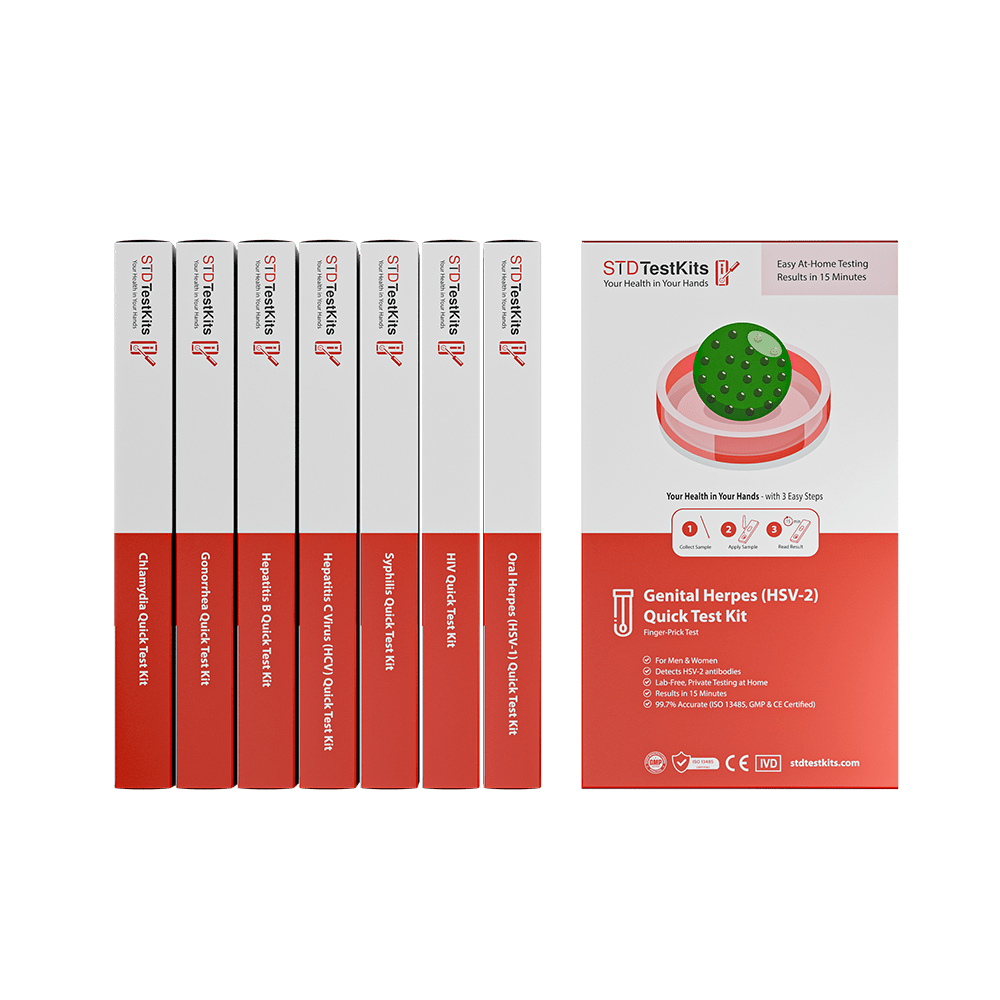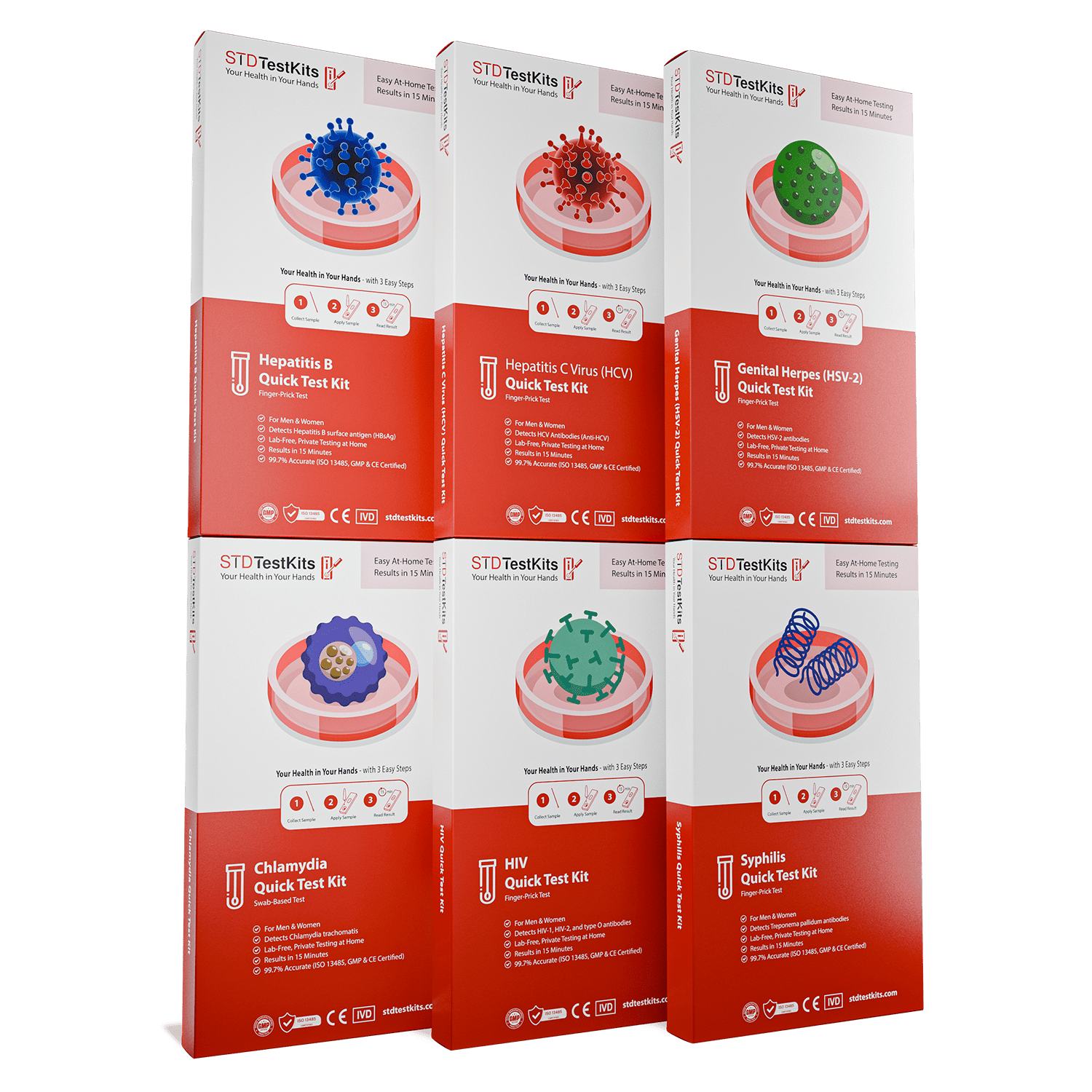The Most Dangerous Sex Act for STDs (And How to Stay Safe)
Quick Answer: You can have safe, fun sex after being diagnosed with an STD. The most important thing is to know when you're not contagious anymore, be honest with your partners, and learn to trust your own body again. It's not about being perfect; it's about being ready and nice to yourself.
Let’s Start With the Fear (Because It’s Real)
Fear after an STD isn’t irrational, it’s earned. You’ve been through a diagnosis, treatment, and possibly shame from partners or doctors. That’s trauma, not weakness.
Common post-diagnosis fears include:
- “What if I infect someone else?”
- “What if they look at me differently once I tell them?”
- “What if it hurts, or I have a flare-up?”
- “What if sex never feels carefree again?”
If these sound familiar, you’re not broken, you’re informed. Fear is part of healing. But it doesn’t have to run the show. With the right tools, that fear becomes something else: caution, self-awareness, respect.
When Is It Safe to Have Sex Again?
It will depend on what kind of diagnosis is given. Some STDs will require only one treatment of antibiotics, whereas others, such as herpes or the AIDS virus, will require on-going care over a long period of time. Ultimately, the first thing that must be determined is at what point the STD is no longer infectious.
Figure 1: Safe sex timelines vary by STD type, make sure you and your partner are both clear before resuming sexual activity.
Rebuilding Desire (Even If You Feel “Gross”)
Here’s a hard truth: STD stigma doesn’t just come from other people. It gets into your head, too. Maybe you feel damaged. Or dirty. Or suddenly unsexy. That’s internalized shame, and it’s a liar.
You are still desirable. Still worthy of pleasure. Still allowed to want and be wanted.
If you're struggling with arousal or performance anxiety, that’s common. Some people find reconnecting with solo touch helps. Others find therapy or journaling useful. What matters is this: don’t force yourself back into sex before you feel emotionally safe. Safety isn’t just about latex, it’s about mindset.
People are also reading: Should You Wait to Have Sex Until STD Results Are In?
Preparing for Your First Time Back
Think of this like stretching before a workout, except instead of your hamstrings, you're warming up your nervous system, your boundaries, and your confidence. The goal isn’t to “nail it.” It’s to feel safe and empowered while showing up in your body again.
Pick the Right Partner (Seriously, This Matters)
If you’re newly diagnosed, the first person you sleep with after treatment can shape your healing experience. Choose someone you feel emotionally safe with, someone who listens when you talk, respects boundaries, and doesn’t pressure you into anything.
This isn’t the time for someone who rolls their eyes at condoms or makes you explain why protection matters. If you’ve been treated for something curable like chlamydia or gonorrhea, make sure your partner is treated too. If you’re living with something longer term, like herpes, choose someone who can meet you with empathy, not judgment.
Have the Disclosure Talk (Before You Take Your Clothes Off)
You don’t have to deliver a TED Talk about your medical history, but you do need to be upfront about anything ongoing or relevant, especially if there's still a risk of transmission.
Here’s a soft, direct script you can use:
"I want to be honest with you before we get physical. I was diagnosed with [insert STD], but I've been treated / I’m managing it responsibly. I care about your safety and mine, so I want to talk about what protection looks like for both of us."
If you feel shaky, practice it out loud first, or write it down. Disclosure is vulnerable, but it’s also powerful. You’re giving someone a chance to meet the real you, and that’s sexy as hell.
Plan for Protection (But Keep It Pleasure-Friendly)
Don't let fear get in the way of fun. Sex that is safe doesn't have to be boring. In fact, making plans for protection can make you feel more confident and less anxious during the act.
Think about these things:
- Condoms that go on the outside (latex or not)
- Internal condoms, which are also known as female condoms
- Dental dams for oral sex, which is especially important if you have herpes or HPV
- Antiviral drugs, such as daily suppressive therapy for herpes
- If you or your partner has HIV, take PrEP or ART.
Tip: Keep your supplies close by and practice how to talk about them in a casual way. "Let me get a condom; I have a few kinds you might like."
During the Act: How to Stay Grounded (And Actually Enjoy It)
It’s normal to have flashbacks, anxiety, or even intrusive thoughts during your first time post-diagnosis. Sex after trauma, yes, even medical trauma, takes a different kind of mindfulness.
Here are a few ways to stay grounded:
- Focus on sensation. What feels good? What textures, temperatures, movements?
- Stay present. If your mind spirals into “what ifs,” bring it back to what’s happening now.
- Use safe words if you're exploring new dynamics or feel overwhelmed.
- Take breaks. You’re allowed to pause, laugh, cry, or stop altogether.
And above all, communicate. Sex isn't a performance. It's an exchange. If something feels off, say it. If something feels amazing, say that too.
After the Sex: What Now?
Your first sexual experience after an STD diagnosis is a huge deal, not because of how it went down in bed, but because of what it means for your healing. Whether it was awkward, amazing, disappointing, or just okay, here’s the truth: you did something brave.
You Might Feel... Weird
It’s normal to have a wave of emotions afterward. Relief. Regret. Pride. Panic. Sometimes all in the same hour. You might replay the moment over and over, wondering if you said the right things or whether they noticed your hesitation. That’s okay.
This isn’t about judging yourself, it’s about observing. What felt good? What felt off? What would you do differently next time?
They Might Ghost. It’s Not About You.
Let’s talk worst-case scenario: what if you disclose, have sex, and then… silence. It sucks. It hurts. And it’s not a reflection of your worth, or your diagnosis.
Some people aren’t ready to handle honesty. Some are just cowards. Others panic because they don’t know how to have an adult conversation about sexual health. Their ghosting says everything about them, and nothing about your value or desirability.
Talk It Out (With Someone Safe)
Whether you’re proud, confused, or somewhere in between, it helps to talk. That could be a friend who knows your status. A therapist. An online support space like r/Herpes or Positive Singles.
You’ve just crossed a major emotional milestone. You don’t have to process it alone.
Sex Can Be Better Now, Yes, Really
This part might surprise you. For a lot of people, sex after an STD diagnosis becomes better, not worse. Why?
Because you’re more aware. More communicative. More intentional. You’ve had to confront your vulnerability, your body, your truth. And that makes for sex that’s not just hot, but honest. Grounded. Awake.
Malik, 29, who was diagnosed with HSV-2 at 25, says:
“I thought I’d never feel sexy again. But now? I only sleep with people I can talk openly with. I feel safer, and way more in control. My sex life got deeper because of the diagnosis, not in spite of it.”
His story isn’t rare. Once you move through the fear, there’s something powerful waiting on the other side: connection that’s real. Not performative. Not silent. Real.
People are also reading: How to Tell a Hookup You Had an STD After the Fact
FAQs
1. How long should I wait to have sex after an STD diagnosis?
That depends on the infection. For something like chlamydia or gonorrhea, you can usually resume sex 7 days after finishing treatment, as long as your partner is treated too. For herpes, wait until there are no sores present. HIV? Make sure your viral load is undetectable. When in doubt, talk to your provider before sliding between the sheets.
2. Will sex ever feel normal again?
Yes. It might feel weird at first, like trying to walk with new legs, but “normal” comes back, and sometimes sex ends up being better because of how honest and intentional it becomes. You’re not broken. You’re evolving.
3. What if I get rejected after disclosing?
Then they weren’t your person. That’s not a cliché, it’s real. Rejection hurts, but it's also a shortcut to clarity. You deserve someone who can handle the truth and meet you in your full humanity. Not everyone can. Let them go.
4. How do I stop obsessing over whether I’ll pass it to someone?
Know your facts. Use protection. Communicate clearly. And if you’re still spinning out, therapy or support groups can help calm the “what if” spiral. The fear fades with time and education. Knowledge is your anxiety’s worst enemy.
5. Is it better to date other people with the same STD?
Not necessarily. Some folks find comfort in shared experience (especially with herpes or HIV), and there are entire communities for that. But you don’t have to limit yourself. What matters more than status is maturity and safety.
6. How do I bring up protection without killing the mood?
Confidence. Humor. Framing. Try: “Let’s make this both hot and safe, I’ve got options.” Keep lube and condoms close by. Treat it like a standard part of pleasure, not a pause button.
7. Can I still have oral sex?
Usually, yes, with a few caveats. If you or your partner has oral herpes (cold sores), skip oral during outbreaks. Dental dams and flavored condoms exist for a reason. If you're unsure what's safe, a quick conversation with your provider (or a trusted resource) can help.
8. Should I get tested again before I hook up?
Yes, if it's been a while or you've had new partners. Testing isn't something you do just once; it's part of your regular care routine. It's like taking care of your teeth, but for your sex life. It shows that you are mature and care about your partners.
9. Where can I get tested discreetly?
Right here: at-home combo STD test kits offer privacy, accuracy, and no awkward waiting rooms. It’s one of the easiest ways to check in with your health before getting back out there.
10. Will anyone actually want me after this?
Yes. But it may not feel like it right now. Getting diagnosed can shake your sense of worth, and make you forget how lovable, sexy, and deeply human you still are. You are not your infection. You are not a walking red flag. You are still someone people can be wildly attracted to, fall in love with, and build a life (or a one-night stand) with. The right people aren’t scared of honesty, they’re drawn to it.
Your Diagnosis Isn’t the End of Your Sex Life
You’re still hot. Still worthy. Still allowed to want, to enjoy, to explore. Yes, your sex life might look different after an STD, but different doesn’t mean worse.
It means smarter. Safer. And often, way more satisfying.
So take your time. Rebuild at your pace. Whether your first time back is full-blown fireworks or just a nervous hand-hold, this is your comeback story. And you get to write every part of it.
Want to feel even more confident before getting back in bed? Start with clarity: get tested, get treated, and know your status. Your future self will thank you.
How We Sourced This Article: We combined expert-backed medical guidelines with lived-experience storytelling to create a guide that’s as emotionally grounded as it is medically accurate. Around fifteen reputable sources informed this piece; below, we’ve highlighted some of the most relevant and reader-friendly ones.
Sources
1. Planned Parenthood – STDs and Safer Sex
2. Reddit – r/Herpes Community
3. Getting Tested for STIs | CDC
4. Psychological Health and Well-being in Patients with Sexually Transmitted Infections | NCBI PMC
5. Is There One STD Test That Can Detect Everything? | Verywell Health
6. How to Share Your STI/STD Status with a Partner | Healthline
7. Get Tested for STIs | American Sexual Health Association
About the Author
Dr. F. David, MD is a board-certified infectious disease specialist with a focus on STD care, trauma-informed sexual health, and destigmatization. His approach blends clinical rigor with a real-world understanding of what it means to live, and love, after a diagnosis.
Reviewed by: R. McKenna, PA-C | Last medically reviewed: November 2025
This article is for informational purposes only and does not constitute medical advice.







